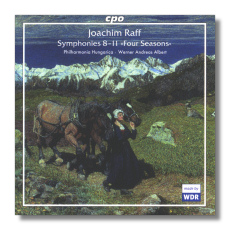
The Internet's Premier Classical Music Source
Related Links
- Raff Reviews
- Latest Reviews
- More Reviews
-
By Composer
-
Collections
DVD & Blu-ray
Books
Concert Reviews
Articles/Interviews
Software
Audio
Search Amazon
Recommended Links
Site News
 CD Review
CD Review
Joachim Raff

Last Symphonies
- Symphony #8, Op. 205 "Frühlingsklänge"
- Symphony #9, Op. 208 "Im Sommer"
- Symphony #10, Op. 213 "Zur Herbstzeit"
- Symphony #11, Op. 214 "Der Winter"
Philharmonia Hungarica/Werner Andreas Albert
CPO 999536-2 DDD 2CDs 76:36, 75:23
The Swiss-born Romantic composer Joachim Raff (1822-1882) is most famous for his "Lenore" symphony, the fifth of eleven works in his symphonic canon. The last four comprise a "Four Seasons" of sorts. Raff's affinity for program music – and particularly for subjects derived from nature, folklore, and the supernatural – is abundantly evident in these four symphonies. Mendelssohn and Schumann are the composers whose music Raff's most resembles.
Each symphony is in four movements, and each movement (with the exception of the Allegretto movement of "In Winter") has a descriptive title. There is an emphasis on the supernatural. "Spring Tones" includes a visit to Walpurgis Night, "In the Summer" has an elfin hunt, and ghosts do a round dance "At Autumn Time." This should come as no surprise from a composer who allowed the titular heroine of his Fifth Symphony to be carried away on horseback by her dead lover. It should be added that there's little reason to hear these four symphonies as a true cycle, or at least to digest them at a single sitting. There are no thematic connections between them, and Raff composed them over a period of six years. (In fact, he left the "In Winter" symphony incomplete at his death, and it had to be completed by one of his pupils.)
These recordings were made between 1992 and 1994 by West German Radio. As far as I know, Albert and the Philharmonia Hungarica are the only performers to have recorded all four of these works, and this two-CD set has no competition. For lovers of forgotten Romantic symphonies, this is a treat, even if the interpretations could have been a bit more joyous and the orchestral playing more refulgent. (This is the same orchestra that Antal Doráti used to record all of Haydn's symphonies decades ago. Sadly, the Philharmonia Hungarica disbanded in 2001 when the German government withdrew its financial support.) The engineering is fine, and the booklets are very comprehensive. Even if the music itself does not quite reach the very first rank, anyone with an interest in early German Romanticism (up until the time of Brahms' First Symphony, say) will receive much pleasure from Raff's four final symphonies, and from these sympathetic performances.
Copyright © 2004, Raymond Tuttle



















